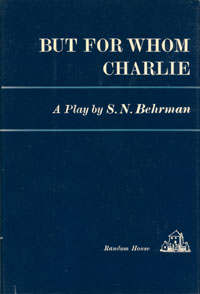|
 |
But
For Whom Charlie
S. N. Behrman
New York:
Random House, 1964
First edition in dust jacket
Inscribed by Behrman |
| |
|
(On front free endpaper)
For Robert E. Conner, / a friend in
need! / Cordially, / S.N. Behrman. / Hanover: May 28, 1964. |
|
|
In the first six months of 1962, Behrman
made news on five separate occasions: in February, Brandeis
University announced him as one recipient of its Creative
Arts Medal for "a lifetime of outstanding artistic
achievement." The following month a ceremony ensued that
included a financial grant to Behrman. In May the newly
formed Repertory Theatre of Lincoln Center for the
Performing Arts announced their first option: Behrmanís
But For Whom Charlie. And Clark University named the
playwright as one of its trustees on 10 June. By yearís end,
another Berman play, Lord Pengo reached Broadway.
From the defeat of Dunniganís Daughter to But For
Whom Charlie, there has been only one work originating
from Behrmanís imagination, the failed "Let Me Hear the
Melody." Translations/adaptations from other playwrights or
works based on other prose sources (including two of his own
writings), comprise the entire twenty-year period. Moreover,
But For Whom Charlie is Behrmanís most socially
conscious play since Dunniganís Daughter, demanding
scrupulous honesty in public trust. It incorporates the four
major themes of his canon: success/achievement, money, love,
and marriage. Rejection of this play would, in many
respects, be tantamount to rejecting the labor of a
lifetime. "Strong men breed weak sons" is examined in two
instances: the effect on Willard Prosper and on Seymour
Rosenthal. In the first instance, the son succumbed, and
while there remains a chance for recovery, the outcome is
left in doubt and not beyond a pessimistic one. Rosenthal,
however, a homosexual in the manuscript, capitalizes on the
relationship with his father. The insecurity associated with
success is personified in the career of Charles Taney, son
of a gangster. Other forms of success are embodied by the
rapacious Gilian Prosper on her upward mobility via the
marriage bed, or by "the meek shall inherit the earth"
reward of the talented Sheila Maloney, or even by
Rosenthalís strength of purpose. Love barely exists. In one
instance love borders on incest; Harry Lorch identifies love
with chastity so strongly he is able to end a relationship
rather like that of Rand Eldredge and Lael Wyngate in
Rain From Heaven. Except for the humanitarianism of the
Rosenthal Foundation, love, together with marriage, becomes
merely an exploitable commodity in the hands of Behrmanís
manipulators. In an interview several years earlier, Behrman
observed, "I realize that the most lucrative thing today is
to dramatize the Latin footnotes in Kraft-Ebbing," and
But For Whom Charlie bears the questionable distinction
of Behrmanís incorporating some of those footnotes to a
degree never before attempted in any of his works. With the
possible exception of David Wayne, whose performance earned
him a nomination for a Tony award, everything about Elia
Kazanís production of But For Whom Charlie for
Repertory Theatre of Lincoln Center worked to the detriment
of Behrmanís play, including the design of the theatre. The
production was "Destroyed by obtuse casting and direction,"
Brooks Atkinson summarized. The production resulted in a
shattering conclusion to a long career, and the play remains
to be rediscovered. |
|